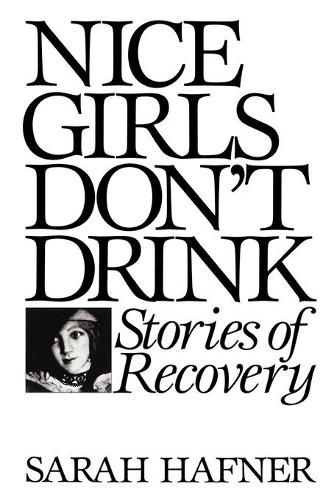
Nice Girls Don't Drink: Stories of Recovery
(Paperback)
Available Formats
Publishing Details
Nice Girls Don't Drink: Stories of Recovery
By (Author) Sarah Hafner
Bloomsbury Publishing PLC
Praeger Publishers Inc
10th February 1992
United States
Classifications
Tertiary Education
Non Fiction
Gender studies: women and girls
362.29
Physical Properties
Paperback
264
Description
What's it like to be a woman alcoholic in America How does a woman's drinking affect her children, husband, lover, employer, fellow workers, and friends "Nice Girls Don't Drink" answers these questions through the voices of some 25 women alcoholics who have hit rock bottom, confronted their addiction face-to-face, and completely turned their lives around. By interviewing women from varied backgrounds, Hafner facilitates the identification process found to be so helpful to recovering alcoholics, and the book contains a section listing suggestions for where to get help, the 12 steps of AA and the affirmations of Women for Sobriety. Though obviously for the women alcoholic "Nice Girls Don't Drink" is also an excellent source of comfort and inspiration for those involved in overcoming an emotional or physical handicap of any kind.
Reviews
"Hurrah for Hafner!"-Dr. Jean Kirkpatrick Executive Director Women for Sobriety
"The resounding message we get from the excruciatingly eloquent voices in this book is that women alcoholics have needs that society is not heeding, and certainly not addressing. Perhaps the underlying theme--which echoes long after the reader puts the book down--is that alcoholism itself may be more symptom than disease, and that the real devastation of these women's lives is an absence of self-worth. Nice Girls Don't Drink is a cry for help we dare not ignore."-Phyllis Hobe Author of Lovebound: Recovering from an Alcoholic Family
. . . these accounts of blackouts, bloating, the DTs, and mental illness may give sufferers of the disease the encouragement they need to find help. Of particular interest is Dr. Jean Kirkpatrick's own story and her conclusion that women alcoholics need a different type of recovery program than men do, which led her to organize Women for Sobriety. But there are as many versions of recovery as there are human beings, and other women are satisfied with the AA method. Hafner doesn't take sides. She simply presents the stories and offers hope. Appended material includes Where to Go for Help, ' The 12 Steps of AA, ' and Thirteen Affirmations of Women for Sobriety.'-Booklist
. . . Hafner has reached out to eighteen recovered alcoholic women . . . through her book, Nice Girls Don't Drink. Their stories are painful, even brutal, yet ultimately inspiring, recorded in voices unmarred by psychobabble or sociological generalizations.-New Directions for Women
Harner, a recovering alcoholic herself, compiled these interviews with 20 recovering women alcoholics because she felt that they could serve as examples and their voices needed to be heard. . . The stories her subjects tell, harrowing yet hopeful, partially confirm her theory that its different for women. Many women alcoholics, like men, have abusive and alcoholic parents, but other factors, like addictions to food and Valium, seem more common among women drinkers. . . Of several voices for a women-oriented recovery approach, the strongest is that of Jean Kirkpatrick, founder of the 30,000-member Women for Sobriety, which aims to give women some empowerment. In AA, she notes, "the basis is humility," which women already have in sufficient quantity.-Publishers Weekly
." . . these accounts of blackouts, bloating, the DTs, and mental illness may give sufferers of the disease the encouragement they need to find help. Of particular interest is Dr. Jean Kirkpatrick's own story and her conclusion that women alcoholics need a different type of recovery program than men do, which led her to organize Women for Sobriety. But there are as many versions of recovery as there are human beings, and other women are satisfied with the AA method. Hafner doesn't take sides. She simply presents the stories and offers hope. Appended material includes Where to Go for Help, ' The 12 Steps of AA, ' and Thirteen Affirmations of Women for Sobriety.'"-Booklist
." . . Hafner has reached out to eighteen recovered alcoholic women . . . through her book, Nice Girls Don't Drink. Their stories are painful, even brutal, yet ultimately inspiring, recorded in voices unmarred by psychobabble or sociological generalizations."-New Directions for Women
"Harner, a recovering alcoholic herself, compiled these interviews with 20 recovering women alcoholics because she felt that they could serve as examples and their voices needed to be heard. . . The stories her subjects tell, harrowing yet hopeful, partially confirm her theory that its different for women. Many women alcoholics, like men, have abusive and alcoholic parents, but other factors, like addictions to food and Valium, seem more common among women drinkers. . . Of several voices for a women-oriented recovery approach, the strongest is that of Jean Kirkpatrick, founder of the 30,000-member Women for Sobriety, which aims to give women some empowerment. In AA, she notes, "the basis is humility," which women already have in sufficient quantity."-Publishers Weekly
Author Bio
SARAH HAFNER is a writer and artist. She attended Amherst College and Pratt Institute, and now resides in Northampton, Massachusetts, where she is at work on her second book.
